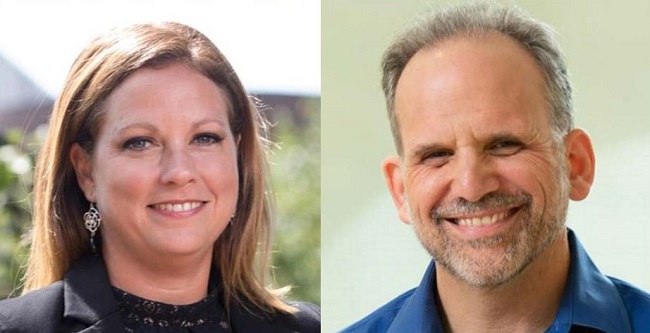
Kirsten Hokeness is a professor and chair of the science department at Bryant University. Joseph Trunzo is a professor and chair of the university’s psychology department. The two have been respectively named director and deputy director of Bryant’s new Center for Health and Behavioral Sciences.
Hokeness and Trunzo spoke with Providence Business News about the center and the programs it will offer students.
PBN: What led to the creation of the Center for Health and Behavioral Sciences?
HOKENESS: Bryant University has been expanding academic offerings in the health and behavioral sciences recently, which has been amplified by the success of the Physician Assistant program. While this is a competitive market in higher education, Bryant is uniquely poised to graduate students with a unique skill set in both the sciences and business. These students will be better prepared to enter the workforce in the interdisciplinary field of health care.
The concept of the Center for Health and Behavioral Sciences is to formalize integration in the institution, particularly between science, psychology and communication, and infuse this with the core business curriculum that Bryant is known for, but in the context of health. It will serve as a conduit to foster research in these areas and enhance collaboration both within the university and with external partners, raising the profile of current ongoing research and generating additional cutting-edge research.
The CHBS was formalized in large part as a result of a $200,000 grant from the Fred M. Roddy Foundation, a nonprofit organization that supports the field of medicine. This grant provides funding to purchase new, state-of-the-art equipment to support laboratory work and has served as a platform to continue development of the center. The foundation executives were attracted to the CHBS’s truly innovative and holistic approach to research and health care, as well as the opportunity to support a generation of students who can work across disciplines to address complex challenges.
PBN: What are your goals for the center as director?
HOKENESS: My overall goal would be to provide a unique and collaborative educational experience for students seeking careers in health sciences, behavioral sciences, or in the health care industry. This would be supported by student research and other critical experiential learning opportunities, along with the development of interdisciplinary academic courses and programs [that] fuse training in the arts and sciences and business.
In addition, it is my hope that the center will help to elevate Bryant’s prominence in the health care arena, making it a premiere choice for students who wish to become the next generation of leaders in the health sector, equipped with an interdisciplinary skill set necessary and lacking in the industry.
PBN: Bryant mentions that the challenges posed by the COVID-19 pandemic have highlighted the critical need for multidisciplinary approaches to identifying and solving problems. What were the needs within the health care sector that were brought to light by the pandemic?
TRUNZO: Every sector of our society has been affected by the pandemic, but nowhere is this more evident than in health care. Biotech and vaccine development, direct patient care, rehabilitation, societal stresses of dealing with social isolation and dramatically changed lifestyles, burnout and care for front-line providers, and skyrocketing levels of depression and anxiety are impacting the health care system in completely new and unforeseen ways.
Previously healthy populations are increasingly vulnerable and already vulnerable populations are collapsing. There is no one field, no one discipline that will solve this crisis. We need a concerted effort from multiple sectors of society – clinicians, researchers, government officials, public health and communication experts, economists and business leaders, just to name a few, in order to get us through this as an intact society.
Bryant’s CHBS is an ideal hub for this kind of interdisciplinary cooperation. We have representative faculty who are experts in almost all of these disciplines and we welcome external fellows who are committed to our mission and vision. While we did not create the center as a result of the pandemic, COVID-19 represents an ideal example of how Bryant’s CHBS plans to use interdisciplinary research and clinical approaches to address big problems.
PBN: What kinds of programs will the center offer for students?
HOKENESS: The center will foster student engagement in research early in their time as undergraduates in order to enhance the probability of publishing before they graduate. The center will create a Summer Research Institute, which is a paid summer experience that will merge curricular experiences with the development of a research project. Students will work with faculty mentors, and hopefully continue that relationship for the student’s time at Bryant, as well as after graduation.
Experiential learning is a hallmark of a Bryant education, and the center will also establish pathways for students to gain experiential learning experiences such as internships, patient care hour and shadowing by developing key community partnerships. Lastly, the center will facilitate the development of new interdisciplinary academic programs to enhance offerings for the university in this area.
PBN: You have said you’re hoping students gain a holistic view of the health care industry, human behavior and mental processes as what you envision for the center. Can you clarify that for our readers?
TRUNZO: When most people think of medicine and health care, they envision seeing a medical doctor for a medical issue that may involve having a procedure or getting a prescription. While this is obviously important and necessary, human behavior is a driving factor in almost all medical issues. Cardiovascular disease rates would drop dramatically if people ate better and exercised regularly. Cancer rates would drop precipitously if people stopped smoking tobacco. Millions of dollars would be saved in the management of Type 2 diabetes if obesity rates were kept in check. Human behavior is complex, and it is a major contributing factor in almost all chronic illnesses and leading causes of death and disability in the U.S.
Dealing with the pandemic is no different. While medical scientists are working tirelessly to develop treatments and vaccines, behavioral scientists need to be involved in facilitating behavior change to stem the spread of the virus and manage the social and personal stress of the pandemic. Communication experts need to be involved in effective messaging of public health recommendations and business leaders need to be involved in developing plans for mitigating economic damage and recovery due to the pandemic.
When we say students need a holistic view of the health care industry, we want them to understand how all sectors of the industry – health sciences, behavioral sciences, communication, epidemiology, economics, public health, business and others – affect the well-being of a patient, a community, a society, a country, and the world. We developed the CHBS at Bryant to better prepare students to tackle these complex problems and be leaders in developing solutions to deeply complex problems for the betterment of humanity.
James Bessette is the PBN special projects editor, and also covers the nonprofit and education sectors. You may reach him at Bessette@PBN.com. You may also follow him on Twitter at @James_Bessette.











